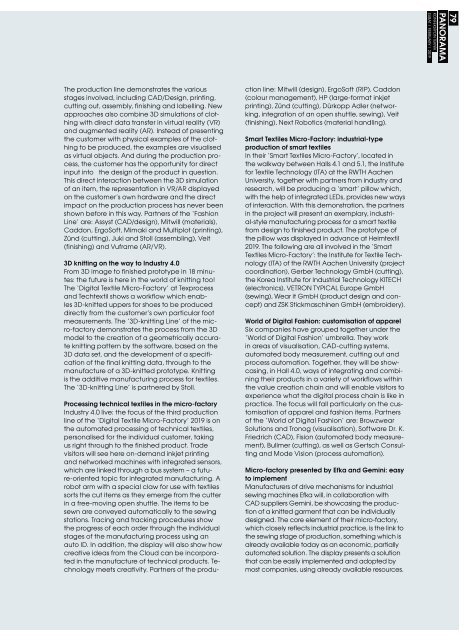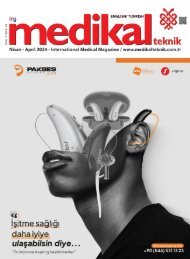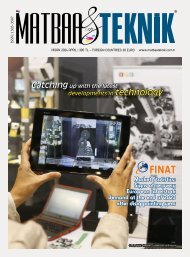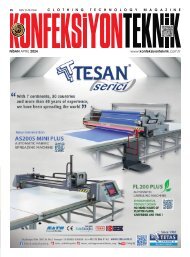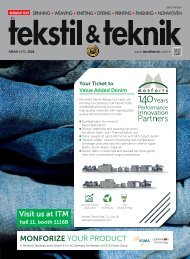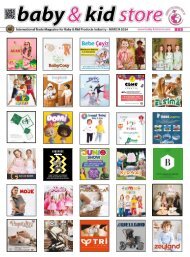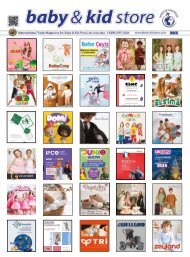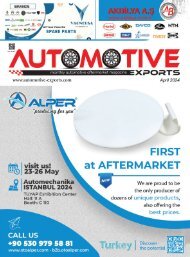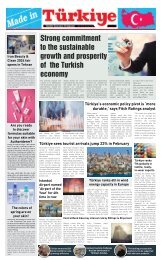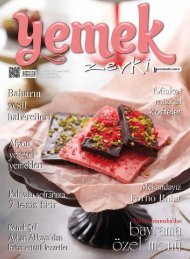konfeksiyon_teknik_subat_2019
Konfeksiyon Teknik Şubat 2019 - Clothing Technology Magazine February 2019
Konfeksiyon Teknik Şubat 2019 - Clothing Technology Magazine February 2019
Create successful ePaper yourself
Turn your PDF publications into a flip-book with our unique Google optimized e-Paper software.
79<br />
PANORAMA<br />
KONFEKSİYON TEKNİK<br />
ŞUBAT | FEBRUARY | <strong>2019</strong><br />
The production line demonstrates the various<br />
stages involved, including CAD/Design, printing,<br />
cutting out, assembly, finishing and labelling. New<br />
approaches also combine 3D simulations of clothing<br />
with direct data transfer in virtual reality (VR)<br />
and augmented reality (AR). Instead of presenting<br />
the customer with physical examples of the clothing<br />
to be produced, the examples are visualised<br />
as virtual objects. And during the production process,<br />
the customer has the opportunity for direct<br />
input into the design of the product in question.<br />
This direct interaction between the 3D simulation<br />
of an item, the representation in VR/AR displayed<br />
on the customer’s own hardware and the direct<br />
impact on the production process has never been<br />
shown before in this way. Partners of the ‘Fashion<br />
Line’ are: Assyst (CAD/design), Mitwill (materials),<br />
Caddon, ErgoSoft, Mimaki and Multiplot (printing),<br />
Zünd (cutting), Juki and Stoll (assembling), Veit<br />
(finishing) and Vuframe (AR/VR).<br />
3D knitting on the way to Industry 4.0<br />
From 3D image to finished prototype in 18 minutes:<br />
the future is here in the world of knitting too!<br />
The ‘Digital Textile Micro-Factory’ at Texprocess<br />
and Techtextil shows a workflow which enables<br />
3D-knitted uppers for shoes to be produced<br />
directly from the customer’s own particular foot<br />
measurements. The ‘3D-knitting Line’ of the micro-factory<br />
demonstrates the process from the 3D<br />
model to the creation of a geometrically accurate<br />
knitting pattern by the software, based on the<br />
3D data set, and the development of a specification<br />
of the final knitting data, through to the<br />
manufacture of a 3D-knitted prototype. Knitting<br />
is the additive manufacturing process for textiles.<br />
The ‘3D-knitting Line’ is partnered by Stoll.<br />
Processing technical textiles in the micro-factory<br />
Industry 4.0 live: the focus of the third production<br />
line of the ‘Digital Textile Micro-Factory’ <strong>2019</strong> is on<br />
the automated processing of technical textiles,<br />
personalised for the individual customer, taking<br />
us right through to the finished product. Trade<br />
visitors will see here on-demand inkjet printing<br />
and networked machines with integrated sensors,<br />
which are linked through a bus system – a future-oriented<br />
topic for integrated manufacturing. A<br />
robot arm with a special claw for use with textiles<br />
sorts the cut items as they emerge from the cutter<br />
in a free-moving open shuttle. The items to be<br />
sewn are conveyed automatically to the sewing<br />
stations. Tracing and tracking procedures show<br />
the progress of each order through the individual<br />
stages of the manufacturing process using an<br />
auto ID. In addition, the display will also show how<br />
creative ideas from the Cloud can be incorporated<br />
in the manufacture of technical products. Technology<br />
meets creativity. Partners of the production<br />
line: Mitwill (design), ErgoSoft (RIP), Caddon<br />
(colour management), HP (large-format inkjet<br />
printing), Zünd (cutting), Dürkopp Adler (networking,<br />
integration of an open shuttle, sewing), Veit<br />
(finishing), Next Robotics (material handling).<br />
Smart Textiles Micro-Factory: industrial-type<br />
production of smart textiles<br />
In their ‘Smart Textiles Micro-Factory’, located in<br />
the walkway between Halls 4.1 and 5.1, the Institute<br />
for Textile Technology (ITA) at the RWTH Aachen<br />
University, together with partners from industry and<br />
research, will be producing a ‘smart’ pillow which,<br />
with the help of integrated LEDs, provides new ways<br />
of interaction. With this demonstration, the partners<br />
in the project will present an exemplary, industrial-style<br />
manufacturing process for a smart textile<br />
from design to finished product. The prototype of<br />
the pillow was displayed in advance at Heimtextil<br />
<strong>2019</strong>. The following are all involved in the ‘Smart<br />
Textiles Micro-Factory’: the Institute for Textile Technology<br />
(ITA) of the RWTH Aachen University (project<br />
coordination), Gerber Technology GmbH (cutting),<br />
the Korea Institute for Industrial Technology KITECH<br />
(electronics), VETRON TYPICAL Europe GmbH<br />
(sewing), Wear it GmbH (product design and concept)<br />
and ZSK Stickmaschinen GmbH (embroidery).<br />
World of Digital Fashion: customisation of apparel<br />
Six companies have grouped together under the<br />
‘World of Digital Fashion’ umbrella. They work<br />
in areas of visualisation, CAD-cutting systems,<br />
automated body measurement, cutting out and<br />
process automation. Together, they will be showcasing,<br />
in Hall 4.0, ways of integrating and combining<br />
their products in a variety of workflows within<br />
the value creation chain and will enable visitors to<br />
experience what the digital process chain is like in<br />
practice. The focus will fall particularly on the customisation<br />
of apparel and fashion items. Partners<br />
of the ‘World of Digital Fashion’ are: Browzwear<br />
Solutions and Tronog (visualisation), Software Dr. K.<br />
Friedrich (CAD), Fision (automated body measurement),<br />
Bullmer (cutting), as well as Gertsch Consulting<br />
and Mode Vision (process automation).<br />
Micro-factory presented by Efka and Gemini: easy<br />
to implement<br />
Manufacturers of drive mechanisms for industrial<br />
sewing machines Efka will, in collaboration with<br />
CAD suppliers Gemini, be showcasing the production<br />
of a knitted garment that can be individually<br />
designed. The core element of their micro-factory,<br />
which closely reflects industrial practice, is the link to<br />
the sewing stage of production, something which is<br />
already available today as an economic, partially<br />
automated solution. The display presents a solution<br />
that can be easily implemented and adopted by<br />
most companies, using already available resources.


